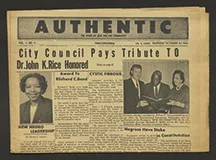An Activist's Cache
A newly catalogued collection of papers sheds light on the life and work of civil rights activist and educator Bertha Waters.
In 2019, the family of Bertha S. Waters donated her papers to Bryn Mawr’s Special Collections Department. Waters (1922–2018), who received her Master of Social Science degree from the GSSWSR in 1979, was a longtime activist in Philadelphia’s Black community.
During the 1960s, Waters wrote a regular column for the Philadelphia Authentic, a Black newspaper, and she was active in education projects before earning her social work degree and also after. In the 1980s she began working as the equity coordinator for the Pennsylvania Department of Education, and she stayed there until her retirement in the 1990s.
Although the pandemic delayed the work to organize and catalogue the collection, that work is now largely complete thanks to the efforts of Simmons University graduate student Julia Egan and Bryn Mawr undergraduate Keyla Benitez ’24, who began working on the papers following her summer 2021 work on the Who Built Bryn Mawr? project.
The collection is especially rich in documenting Waters’ activism and work in education. Her column “Something to Think About” for the now- hard-to-find Authentic in the early 1960s discussed civil rights demonstrations nationally and in the Philadelphia area, the writings of James Baldwin, the Pennsylvania court system, and religious liberty, among other subjects.
The collection includes newspapers with her columns from late 1963, as well as drafts of her columns. She also frequently wrote letters to the editors of the Philadelphia Inquirer and other newspapers and magazines commenting on current events, and the collection includes many of these letters in draft form, as well as copies of any that were published.
Later in the 1960s she began to work for the Educational Project, Inc. (EPI), an organization started in 1965 under the Pennsylvania Department of Public Welfare to support research and reform in education. Waters served as the southeast regional representative in the early 1970s and devoted much of her time to the Pennsylvania Day Care Project, an effort to set standards for day care facilities in the state. The collection contains extensive records from Waters’ time with the EPI and especially on the Day Care Project.
Because of Waters’ wide range of contacts, the collection is also a valuable source for newsletters, flyers, and other documentation on activist groups in Philadelphia, including an extensive run, from 1971 to 1985, of the Oakes Report, an influential newsletter advocating for reform in the Philadelphia schools, that was edited by one of her friends, Helen Oakes.
During the early 1960s, Waters also opened her home to civil rights organizers who worked in the South, one of whom, Jim Benston, left behind a pile of flyers and pamphlets on both the civil rights and anti-Vietnam War movements, as well as a journal that he wrote on a roll of toilet paper while he was in a southern jail following his arrest during a demonstration.
Published on: 08/10/2022

